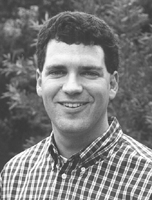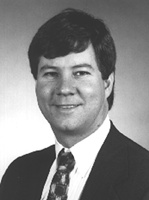Morton, Thompson Honored with Presidential Early Career Awards
May 14, 1998
David P. Morton and Lonny L. Thompson received Presidential Early Career Awards for Scientists and Engineers (PECASE) in a White House ceremony on November 3, 1997. The SIAM members were two of 20 National Science Foundation-supported researchers chosen to receive the awards, which were established in 1996 to recognize outstanding young scientists and engineers who are in the early stages of their independent research careers.


David Morton (left) and Lonny Thompson hope that their receipt of Presidential Early Career Awards in 1997 will inspire other young researchers to tackle the tough problems that U.S. scientists and engineers will face in the 21st century.
"I feel very honored to receive the award," says Morton, who is an assistant professor in the graduate program in operations research in the Department of Mechanical Engineering at the University of Texas at Austin. "It is certainly nothing that I expected and it's nothing that I earned as an individual." Morton says that he has been fortunate to work with highly talented colleagues at the University of Texas, the Naval Postgraduate School, Stanford University, and in industry.
Morton, who graduated from Stetson University with a BS (1987) in mathematics and physics and from Stanford University with an MS (1990) and PhD (1993) in operations research, works on Monte Carlo sampling-based algorithms for solving stochastic programs and on applications in semiconductor manufacturing, electric power systems, telecommunications, strategic airlift, and finance. His research is in the stochastic programming of the optimization models of complex systems that contain significant uncertainties. The PECASE citation recognized both his innovative research in these areas, and the help he has given students in gaining industrial experience. Before arriving at UT-Austin in 1995, he spent two years at the Naval Postgraduate School, first as a National Research Council Postdoctoral Fellow and then as a visiting assistant professor.
Lonny L. Thompson, an assistant professor in the Department of Mechanical Engineering at Clemson University, received the award for his work on predictive models for structural acoustics that are applicable to noise suppression and sonar tracking and for facilitating student involvement in real-world engineering problems. His project develops an adaptive space-time finite element methodology that allows for accurate and efficient prediction of the dynamic response of complex structural acoustic systems over a broad range of scales and frequencies, including those in the mid-frequency range. The methods, he explains, employ finite element discretization of the time domain as well as the usual discretization of the spatial domain. This novel approach to the modeling of the temporal variables allows for the consistent use of adaptive solution strategies for unstructured grids in both time and space, a technique that significantly improves the efficiency and reliability of the resulting computational algorithm over standard methods. Through its orchestration of the distribution of mesh sizes and spectral orders in space-time, the modeling technique has significant flexibility and scope.
The educational plan at Clemson enhances the learning process for both undergraduate and graduate students through a comprehensive array of innovative teaching activities and industrial exchanges, says Thompson. Educational activities include development of a curriculum in finite element analysis; setting up experimental, computational, and multimedia laboratories for graduate and undergraduate teaching; use of symbolic computing systems for innovative teaching and learning; involving undergraduate students in collaborative research projects; educational collaborations with industry; and outreach activities, including delivering short courses and workshops over the Internet via video conferencing and the World Wide Web.
Thompson received a BS (1985) in applied science from the University of California at San Diego, and an MS (1989) in civil engineering and a PhD (1994) in computational mathematics from Stanford University. Prior to attending Stanford, he worked as a structural engineer at General Dynamics Space Systems Division.
"I am honored by this award and excited by this opportunity for both undergraduate and graduate students at Clemson to be directly involved in fundamental research at a national level," says Thompson. "This award will provide funding for four PhD graduate students in the Department of Mechanical Engineering in the area of dynamics and acoustics, and will help strengthen the Computational Mechanics and Engineering Computing Program at Clemson.
"This award will also provide funding for a research internship for highly motivated undergraduate students at Clemson," Thompson adds. "During the summer these students will have the opportunity to work very closely with myself and the graduate students on a technically challenging research project. This will afford a great educational opportunity for the students to be directly involved in relevant research.
"As an integral part of the research and education plan, students at Clemson will have an opportunity to present research results and exchange ideas with several companies involved in the design and application of computational methods for the solution of complex structural dynamic and acoustic systems of industrial significance."
Recipients of the PECASE awards, who were chosen from the engineers and scientists who have been part of NSF's Faculty Early Career Development Program (CAREER), will receive up to $500,000 over a five-year period to further their research.
Thompson believes that awards such as those given for the NSF CAREER and PECASE programs are very helpful for young engineers and scientists building quality research programs in the U.S. "These awards allow young investigators to explore new ideas and build a research program that combines fundamental and applied research with direct application to problems of industry," he explains. "Through funding of the CAREER and PECASE programs, it is satisfying to know that the U.S. government shares our values in the importance of research to build a better future."
Receiving such recognition is "wonderful," adds Morton, who maintains that such awards programs help boost the morale of young scientists enormously. "We have a very strong operations research program here at UT-Austin," he explains, "and this award will help us to recruit, and support, first-rate PhD students to do research in this area."

